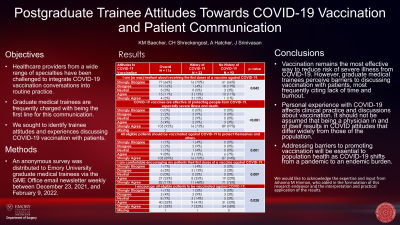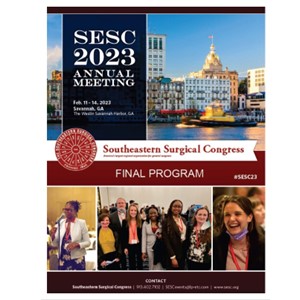Back

Other
Category: Quickshot Oral Session 11
Quickshot Oral : Quickshot Oral Session 11
POST-GRADUATE TRAINEE ATTITUDES TOWARDS COVID-19 VACCINATION AND PATIENT COMMUNICATION
Sunday, February 12, 2023
7:00am – 8:00am East Coast USA Time


Kirsten Baecher, MD
General Surgery Resident
Emory University, United States
Kirsten Baecher, MD
General Surgery Resident
Emory University, United States
Presenter(s)
Principal Contact(s)
Objectives: Healthcare providers have been challenged to integrate COVID-19 vaccination conversations into routine practice, in part because of evolving guidelines and political controversy. Graduate medical trainees are frequently charged with being the first line for this communication. We sought to identify trainee attitudes and experiences discussing COVID-19 vaccination with patients.
Methods: An anonymous survey was distributed to Emory University graduate medical trainees via the Graduate Medical Education Office email newsletter weekly between December 23, 2021, and February 9, 2022. Program directors were given electronic flyers to display during educational sessions. Free-text responses were reviewed, and quantitative data were analyzed in REDCap.
Results: Of the 116 total respondents, 64% were female and the median age was 30 years (range 26-40). All respondents were at least partially vaccinated, though 13% reported hesitancy about initial vaccination and 8% indicated hesitancy about receiving a booster dose. Nineteen percent disclosed a history of COVID-19 infection, among whom 45% reported infection post-vaccination. While 90% of respondents strongly agreed that all eligible patients should be vaccinated against COVID-19, only 54% strongly confirmed encouraging all their patients to be vaccinated. Among barriers cited to discussing vaccination, 47% identified time constraints and 44% reported feeling too burned out.
Conclusion: Vaccination remains the most effective way to reduce risk of severe illness from COVID-19. However, graduate medical trainees perceive barriers to discussing vaccination with patients, most frequently citing lack of time and burnout; furthermore, personal experience with COVID-19 affects personal beliefs about vaccination, and it should not be assumed that being a physician in and of itself results in COVID attitudes that widely differ from the population. Addressing barriers to promoting vaccination will be essential to population health as COVID-19 shifts from a pandemic to an endemic burden.
Methods: An anonymous survey was distributed to Emory University graduate medical trainees via the Graduate Medical Education Office email newsletter weekly between December 23, 2021, and February 9, 2022. Program directors were given electronic flyers to display during educational sessions. Free-text responses were reviewed, and quantitative data were analyzed in REDCap.
Results: Of the 116 total respondents, 64% were female and the median age was 30 years (range 26-40). All respondents were at least partially vaccinated, though 13% reported hesitancy about initial vaccination and 8% indicated hesitancy about receiving a booster dose. Nineteen percent disclosed a history of COVID-19 infection, among whom 45% reported infection post-vaccination. While 90% of respondents strongly agreed that all eligible patients should be vaccinated against COVID-19, only 54% strongly confirmed encouraging all their patients to be vaccinated. Among barriers cited to discussing vaccination, 47% identified time constraints and 44% reported feeling too burned out.
Conclusion: Vaccination remains the most effective way to reduce risk of severe illness from COVID-19. However, graduate medical trainees perceive barriers to discussing vaccination with patients, most frequently citing lack of time and burnout; furthermore, personal experience with COVID-19 affects personal beliefs about vaccination, and it should not be assumed that being a physician in and of itself results in COVID attitudes that widely differ from the population. Addressing barriers to promoting vaccination will be essential to population health as COVID-19 shifts from a pandemic to an endemic burden.

